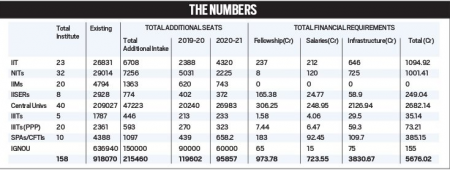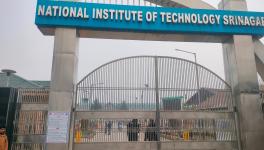EWS Expansion to Be Hit by Infrastructure, Staff Deficit
Image for representational use only.Image Courtesy : The Indian Express
The centrally funded educational institutions have sought funds worth Rs. 5,600 crore for implementing the Economically Weaker Section (EWS) quota passed by the Parliament last month. The expansion, which will result in additional intake of 1,19,602 and 95,857 seats in 2019-20 and 2020-21 respectively, is slated for implementation from the academic session beginning in July.
The implementation plan shared by the centrally funded institutions- including central universities, IITs and IIMs- to the Ministry of Human Resources Development stated that they need Rs. 3,830 crore for infrastructure expansion whereas an additional Rs. 723 crore would be required for recruitment of new teachers and their salaries. The institutions have also demanded Rs. 973 crore to distribute fellowships.
The biggest share of the proposed money amounting to Rs. 2,682 crore has been demanded by the central universities followed by the Indian Institutes of Technology (IIT) and National Institutes of Technology (NIT). While IITs need Rs. 1,094 crore to implement the quota, NITs require Rs. 1,001 crore for the scheme. The proposed demand for money is much greater than the expectation of MHRD which had estimated Rs. 4,200 crore for EWS quota expansion.
Also Read: 10% Quota: An Electoral Ruse That Will Yield Nothing
While the BJP is looking to woo voters ahead of general elections, the ambitious project's implementation is likely to be hit by major roadblocks like infrastructure and staff deficit. It also appears that funding for implementation may get short as the interim budget presented earlier this month has earmarked only Rs. 4,600 crore, which falls short by Rs. 1,000 crore than the demanded money. The government estimate also did not make clear the categorisation for infrastructure expansion and teachers. It also remains clueless on the amount for fellowships.
The centrally funded institutions have also been facing acute deficit of teachers for many years. In a reply to the question by Lok Sabha MP P K Biju, the HRD Minister Prakash Javadekar said that central universities have 6,141 vacant positions. In recent years, major universities like Delhi University and Banaras Hindu University have started depending upon Ad Hoc teachers to teach their academic programmes. Many academicians believe that despite EWS expansion the students will be deprived of quality education.
Also Read: Central Universities in India Are Vastly Understaffed

Courtesy: The Indian Express
Talking to NewsClick, Abha Dev Habib, former Executive Council Member of Delhi University argued that the university could not implement the OBC expansion in a full-fledged manner even when it was introduced in 2007. She said, “We have an experience from the Moily Committee which allotted enough money to implement the scheme but it took years to build infrastructure. Many colleges had applied for building new class rooms but sanctions were not granted for them. Infrastructure for the OBC expansion in most DU colleges was created at the expense of sports grounds. Colleges may fail to add class rooms and labs as they do not have space."
She added, “We were allotted only half of the teachers for OBC expansion. As far as EWS quota expansion is concerned, it cannot be implemented successfully without resolving the current situation which demands the regularisation of over 4,500 Ad Hoc teachers. If you see a recent notification by MHRD to centrally funded institutions, it asks them to provide information on the number of guest/ contract teachers required for expansion. We are also likely to experience a push from the central government to borrow loans from the Higher Education Finance Agency. Remember, it's loan not grants. Thus, it will also lead to commercialisation of education."
Read More: SCs and STs Biggest Losers in University Recruitment since March
Get the latest reports & analysis with people's perspective on Protests, movements & deep analytical videos, discussions of the current affairs in your Telegram app. Subscribe to NewsClick's Telegram channel & get Real-Time updates on stories, as they get published on our website.
























